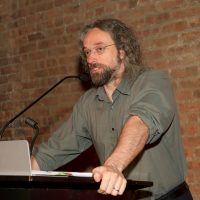Historian, Scientist, Philosopher
Environment • History • Science
 Historian, Scientist, Philosopher
Historian, Scientist, Philosopher
Matthew Stanley teaches and researches the history and philosophy of science. He holds degrees in astronomy, religion, physics, and the history of science and is interested in the connections between science and the wider culture. He is the author of Practical Mystic: Religion, Science, and A. S. Eddington (Chicago 2007), which examines how scientists reconcile their religious beliefs and professional lives, and Huxley’s Church and Maxwell’s Demon (Chicago 2014), which explores how science changed from its historical theistic foundations to its modern naturalistic ones. His current project is a history of scientific predictions of the end of the world. Professor Stanley is also part of a nationwide National Science Foundation-funded effort to use the humanities to improve science education in the college classroom. He has held fellowships at the Institute for Advanced Study, the British Academy, and the Max Planck Institute. He currently runs the New York City History of Science Working Group. Professor Stanley was awarded a 2014-2015 Gallatin Dean’s Award for Excellence in Teaching.
Scientists like to talk more about what they know than what they don’t know – things they are sure about rather than the mysteries. Hundreds of years of discoveries and insights are good reasons for this. But it is the unknowns at the edge of science that drive some of the most exciting research being done today. We do not know if we are alone in the universe, what the nature of consciousness is, where life came from, or why you are made of protons and electrons.
Those persistent mysteries, rather than causing us to question science, can help us understand how science works. They can help us ask deeper questions about how we know what we know, and why some things we don’t.
Einstein’s name is synonymous with genius. His wild-haired, thoughtful-eyed face has become an icon of modern science. His ideas changed the way we see the universe, the meaning of truth, and the very limits of human knowledge. This presentation will examine how Einstein’s youthful philosophical questioning led to a revolution in science. It will look at his creation of special and general relativity, and particularly how these epochal theories emerged from his seemingly simple questions about how we experience the world. His preference for easily-visualizable thought experiments means we will be able to engage deeply with the science with very little mathematics. Einstein also pioneered quantum mechanics, only to reject its strange consequences and eventually devote his life to overturning it through a unified field theory.
Einstein’s elevation to worldwide fame was closely tied to political and social developments such as World War I, Zionism, and the rise of the Nazis. As he became an incarnation of genius, people sought out his views on everything from world peace to the nature of God – and his opinions often had surprising links to his scientific work. The picture of Einstein we end up with is a figure somehow both revolutionary and deeply traditional, emblematic of the modern age, and also profoundly uncomfortable with it.
Since the time of the ancients, we have wondered whether the universe cares about us. Is the universe friendly to life, with fecund planets scattered through the heavens? Or is it indifferent, with our green globe a fluke among barren rocks? Modern scientists hope to answer these questions with radio telescopes and experiments in the laboratory – they seek to link the science we find in our corner of the universe to truly cosmological claims about life and the laws of nature. Until very recently, these questions have been accessible only to speculation. But the amazing progress in the science of recent decades has finally given us an opportunity to begin to test these ideas. The Search for Extraterrestrial Intelligence (SETI) goes on, even as robotic spacecraft explore our own solar system and we examine our own world for clues about the nature of life in the universe.